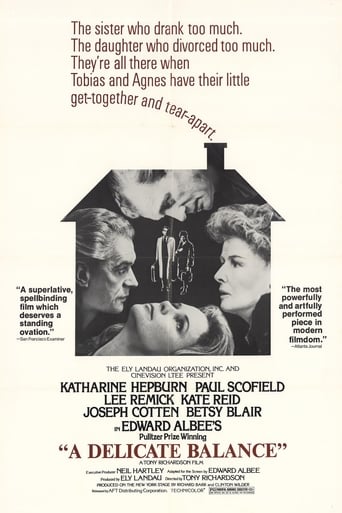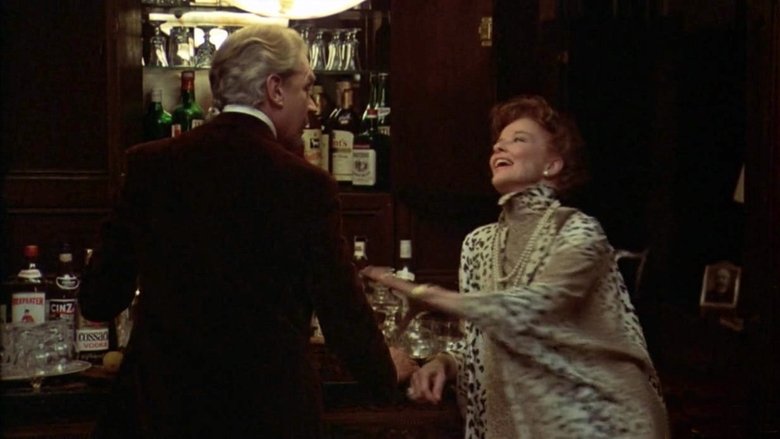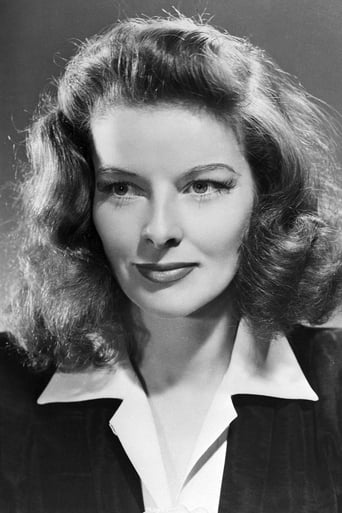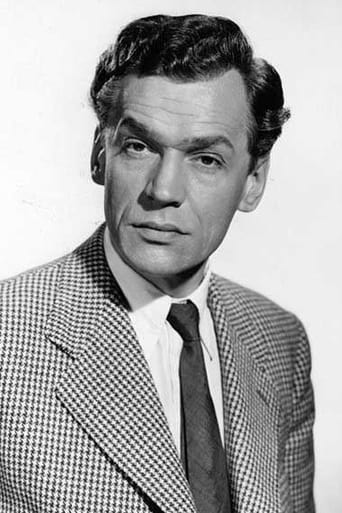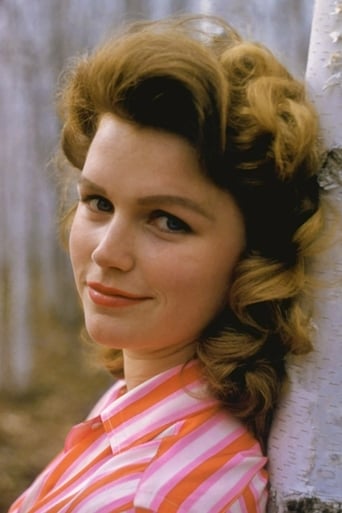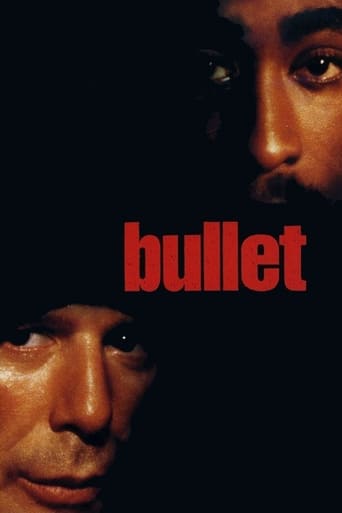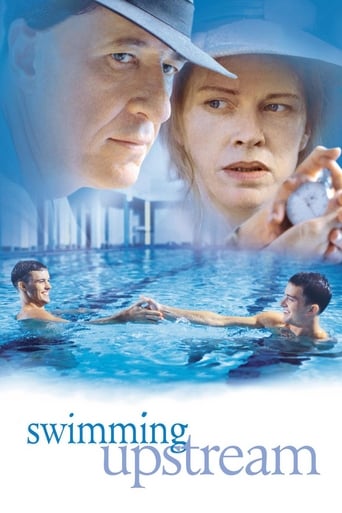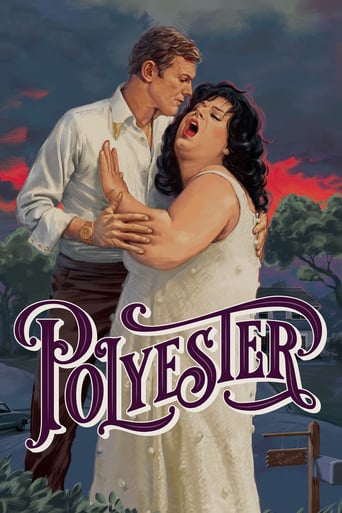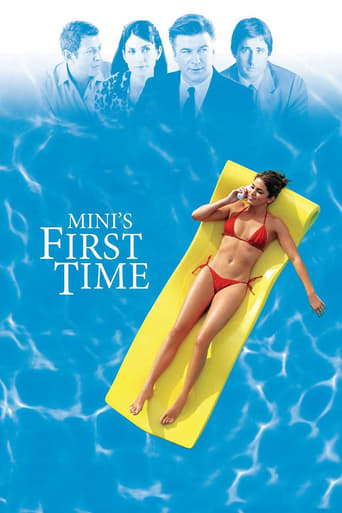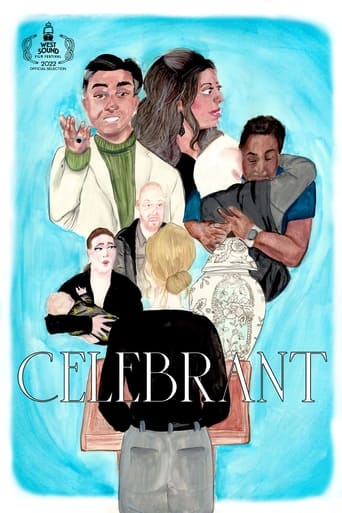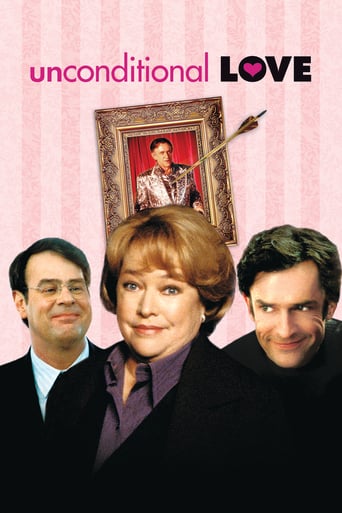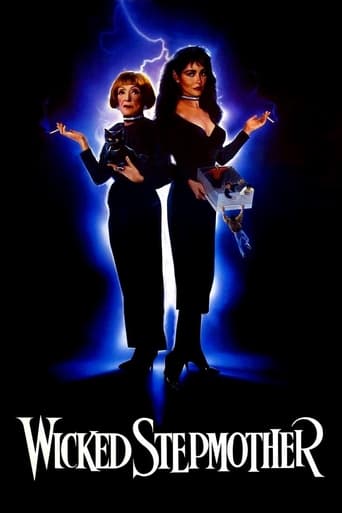A Delicate Balance (1973)
In their nice Connecticut home, Agnes and Tobias have grown used to the imperfection and fragility of their marriage. Quietly nursing their grief over the death of their son, they get by well enough together. Agnes' boozy sister wanders in and out, and they allow anxiety-stricken friends to move into an upstairs room. But, when their daughter, Julia, shows up announcing her fourth divorce, long-repressed emotions come to the surface.
Watch Trailer
Cast


Similar titles
Reviews
I think this is a new genre that they're all sort of working their way through it and haven't got all the kinks worked out yet but it's a genre that works for me.
A terrific literary drama and character piece that shows how the process of creating art can be seen differently by those doing it and those looking at it from the outside.
Although I seem to have had higher expectations than I thought, the movie is super entertaining.
An old-fashioned movie made with new-fashioned finesse.
This Edward Albee play was directed for film by Tony Richardson and has an all-star cast headed up by Oscar winners, Katherine Hepburn, and Paul Scofield as a late middle-age couple living a "delicate balance" in their up-scale New England home. The balance is disrupted when their best friends (Betsy Blair and Joseph Cotton) arrive to stay with them because they feel "an indescribable sense of terror" in their OWN house. After these friends are given their married daughter's room, she (Lee Remick), returns "home" to re-take residence in her old room, announcing that she is on the verge of yet another of her several divorces. Added to this is the fact that Kate Reid (who plays Hepburn's sister) has never left the home in the first place.The drama plays out as each of these characters try to confront their situations without knowing how to broach it except through drinking, worrying, and trying to talk it through.
In Connecticut, Agnes and Tobias (Katharine Hepburn and Paul Scofield) are an upper-class married couple whose relationship has been uneasy for many years, since at least the time their son died; but they've managed to find a certain comfortable pattern of uneasiness. Agnes's sister, Claire (Kate Reid), lives with them and insists that her perpetual drinking is not alcoholism but willfulness. Their daughter, Julia (Lee Remick), poised to have her fourth divorce, has come back home. Unexpectedly, her room has been taken over by Harry and Edna (Joseph Cotten and Betsy Blair), best friends of Tobias and Agnes. Seized by a nameless terror that propelled them out of their own house, Harry and Edna have decided to stay.The slightly elliptical nature of this material is more annoying than fascinating, but there's still plenty of interest and plenty of opportunity for a team of terrific actors to do their thing. Yet another great Katharine Hepburn performance preserved on film is yet another reason for us to be grateful, but Paul Scofield and Kate Reid have left fewer of their performances for posterity; and so it's nice we have this film, which gives each a fully realized character to play."A Delicate Balance" is a play by Edward Albee, produced by the American Film Theatre with no alterations and no foolish attempts to open it up. Alfred Hitchcock proved several times that a limited space can be an asset to a movie; and while the film making here is not at his level, Tony Richardson does a nice job at directing our eye and staying out of the play's way.
Of course, "A Delicate Balance" can not be spoken of without referring to some way to Albee's other masterpiece, "Who's Afraid of Virginia Woolf?" I think the Pulitzer that "A Delicate Balance" won was supposed to be shared by "Woolf," which was rejected at the time for being too vulgar.Not to say that "A Delicate Balance" is not a worthy dramatic work. It's an incredibly intelligent script; Albee makes broad statements about love and aging here that might be missed in a first viewing. Yet "Woolf" shows a much smoother weaving of absurdism into matters than "Balance." I was far more convinced by George and Martha's "son" than I was by Harry and Edna's "terror." As far as transitioning from stage to screen, I thought "Woolf" was also much better, but mostly because of Mike Nichols and Haskell Wexler, the cinematographer.The cinematography here, I felt, was meant to look as much like a stage play as possible. And at times, I liked it. And the acting is so good in this movie (for the most part) that I was still hooked. But the whole time, I was thinking, "What if Mike Nichols directed this?" Alas, because there is no music either (it would have been nice), we're left only with the acting. And what a fine cast. Katherine Hepburn has a difficult role to pull off with Agnes; she is both the "fulcrum" of this family and, admittedly, part of its defeat. And she does it so well. There is this agony in her eyes towards the latter half of the film that you just can't look away from. And I like her mannerisms, the way she toys with words, the voices she does. Sure, sometimes a few words are lost, but it seemed fitting to the character. Agnes makes speeches (Claire and Tobias have a nice dialogue about this after Agnes's first exit), and I think she makes them for herself as much as she does anybody else. And Hepburn makes it all intriguing. She holds her ground as arguably the finest actress of American cinema.Paul Scofield ultimately disappointed me. Yes, he is bland and ineffectual, and despite the strength in his eyes, the confidence of his body language, he never quite makes a difference. He pulls all of that off well. And he does have one fantastic moment where Agnes says, "I'm not an old woman, am I?" and, perhaps inspired by Claire and her accordion and drunkenness, grabs her chin and playfully says, "Well, you're my old lady!"--the most life we've seen in him the entire film--and Hepburn just rejects him. The way he pulls back and returns to his shell is painfully uncomfortable. But then, there is what Albee calls in the script an "aria" at the end, in the scene he has with Harry. This is Tobias's moment; the moment I waited for the entire film. I felt that Scofield botched it. He sits through almost all of it. He says only one or two of the lines with any real power, the kind of power Tobias should be storing up the entire movie. And at the end, when he cries--much too late, in my opinion--it is pathetic and almost ignored by anyone else in the room. (As the women do enter halfway through.) Anyway, I was really let down by this, and I think it's the biggest mistake this adaptation made.Meanwhile, Kate Reid practically steals the film when Hepburn isn't looking. She's absolutely fantastic as Claire. What I really loved was how Reid managed to find the sympathy in Claire. Claire was once played by Elaine Stritch--can you imagine? How terrifying. But while Reid manages to reach those levels of darkness that Stritch probably could, she also turns her twisted past into something that makes her sympathetic of others. She knows pain. And by god, if she doesn't sound EXACTLY like Elizabeth Taylor in "Woolf." It's eerie, but for fans of Albee, incredibly comforting in its familiarity. As if, "This is the way to portray an Albee woman." And she also creates a unique chemistry with each character. I loved the relationship between Claire and Tobias, and the way every "act" of this movie (except for the ending) closed with the two of them. They have a bond that Agnes is wary of. Also, notice the strange way she interacts with Harry. It's rather terrific, and never truly highlighted. Lee Remick was on and off here, but as one of the other reviewers pointed out, it's not a fully-realized role. Imagine: a woman of thirty-six divorced four times already. Where is the sense of failure, the constant rejection, the bitterness? Julia goes from being rather calm, smoking casually and turning her nose up at her mother, to a level of hysteria that would make Tennessee Williams wipe the sweat from his brow, with no clean transition. A confusing role.Finally, Joseph Cotten and Betsy Blair. Once again, not fully-developed characters. Joseph Cotten played the role as I expected him to, and that's not a bad thing. He's a terrific actor. He doesn't necessarily make any mistakes here. Betsy Blair was on and off for me, and this I felt was her acting. There was a tentativeness in her voice, a resistance to really attacking the role of Edna and making her, honestly, as unwelcome as she was in this house. She is interesting in that she begins to take over for Agnes the longer she stays (there is a shot of Hepburn realizing this, and the look of horror on her face is absolutely brilliant), but I felt that Blair could have gone further with it.I think "A Delicate Balance" is, as others have noted, a movie for Albee/theatre fans only. It's not cinematic ally engaging, but if you are familiar with the script, you may enjoy seeing an interpretation of it, particularly with Hepburn and Reid.
Director Tony Richardson's presentation of "A Delicate Balance" could be dismissed for it's lack of edginess and it's gentrified (albeit screwed up) characters. It is also what critics would call a "stagy" film. Yet it is redeemed from this dour damnation because of Albee's wonderful way with words, the rich cinematography, and exceptional acting, exceptionally well cast: Katherine Hepburn, Paul Scofield, Lee Remick, Joseph Cotton.For those looking for a violent film -- not in the form of bullets or explosions -- but of verbal surgical strikes, this is it. Edward Albee's dialogue provides all the female (yes, this would be considered a "woman's movie") protagonists and antagonists (one wonders at times which is which) a laser like aim against their primary targets: other women. And it is done under a guise of "civility"; sometimes, with a smile.The stand-out among these veteran actors is Kate Reid, who plays Claire, the alcoholic in-law who at times gives the most voice to the story, set amid a dysfunctional Connecticut family. But even her performance can't out weigh the constant barrage of verbal cross-fire from her friends and in-laws. Yet the twist here is that the aggressors are the women, while the men attempt to keep the peace as best they can -- only firing back if attacked by the females.This isn't a film for everyone; it's definitely the stuff of classic drawing room (psycho) drama. But for those who can appreciate consummate acting armed with deft dialogue, make yourself a nice cup of tea -- spiked with a shot or two of brandy -- and check this out.

